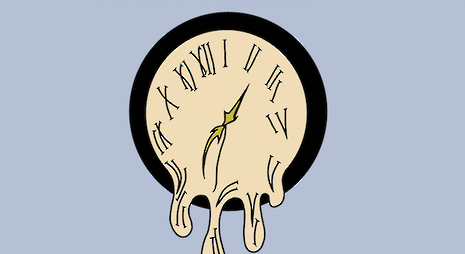Healing my relationship with time
I have learned to let go of the anxiety that governed my Cambridge days, of the impulse to fill every moment productively

I roll over as the alarm goes off to see daylight filtering through the curtains; ever since the sun started rising at 6 am, it has become difficult to ascertain whether I’ve overslept. I put the kettle on and settle by my desk, eyes peering into the foliage beyond my windowsill and Bible opened to the book of Isaiah. The quiet ritual of morning tea and scripture reading has brought a fluency to the days, a familiarity that helps to steady the scattered mind and reorient it toward the things that I hold most important: a sense of communion with the divine, a confronting of anxieties for the day that lies ahead, a prayer to be led in love to those around me. Perhaps it is ironic that this daily rhythm only took shape in the midst of exam term, once the humdrum of relentless academic and extracurricular activity came to a rest.
The poet and philosopher John O’Donohue articulates the belief that stress is a perverted relationship to time. He states, “rather than being a subject of your own time, you have become its target and victim, and time has become routine. So at the end of the day, you probably haven’t had a true moment for yourself.” It is this unforgiving cycle of busyness that had come to characterise most of my first two years at Cambridge: early morning exercise, lectures, supervisions, meetings, rehearsals, performances, essays, edits, drinks, and a stumbling back to bed at the end of each day. A part of me felt beleaguered by the desire to maximise my use of the time that had been allotted each term, a desire to uphold varying commitments to schoolwork and broader community life. I made cursory attempts to pencil in a reflection in my journal each evening before I slept but eventually found myself falling behind on an activity meant to stir a restful introspection.
While the prospect of burning out always lingered dangerously close by, as the twitching of my eyelids served to constantly remind me, it was only falling physically ill that forced me to slow down by the end of Lent. Upon recovering, it remained apparent that I hadn’t quite embraced an ethos of rest. I fastidiously filled up my schedule with friends to visit, books to read, and exam material to prepare. I’d had a preemptive moment of panic upon realising that I didn’t quite feel prepared for the cunning questions the English Tripos would hurl my way. I needed to figure out coherent methods of shaping my study material and needed to read more plays and poems if my mind was to be at ease. It was only at a Christian conference in Wales, a week and a half before the resumption of term, that I was slapped across the face during a talk:
“Your work ethic is rubbish if you have no rest ethic.”
The Christian faith instructs a model of work and rest that I’d always nursed at the back of my mind but never taken to heart: for every six days of work, one day should be set aside for rest. It is a principle to be guarded jealously– not out of selfishness, but out of recognition that the human body has physical and spiritual needs that need to be addressed in order for it to keep going.
I have learned to let go of the impulse to fill every moment productively
The relentlessness of a Cambridge term makes this difficult to adhere to. My experience as an English student has shown that the number of literary works that needs to be read and essays that need to be written effectively compresses many more days’ worth of work into an arbitrary eight-week cycle. The mechanistic quality of being trained to read and write quickly inhibits opportunities to relish the texts that are set before us. Rather, it cultivates a masochistic sense of achievement at having completed the exhausting task of keeping up with deadlines. I’d come to bear some resignation that, save for a complete overhaul of the structure of the Cambridge academic year and a reduction of the weightage of written exams, there would be little prospect for change. The cognitive dissonance of my time in the army seemed to resurge: of resenting a system, but also wanting to thrive in it.
Coming back to Easter term, I was struck by the notion that there can be no work without rest, and that rest is not a negation of any sort of activity. It is a principle reiterated in the book of Hebrews, to “make every effort to enter God’s rest”. And so, I decided to make a conscious effort to be disciplined with rest and to take one day a week off to do things that I found nourishing and to lay my work aside. I remained tentative, obstinately insisting to myself that replying to emails did not constitute work, nor did arranging the format of my notes.
Eventually, I learned to let go of the anxiety that governed the impulse to fill every moment productively. It was a return to the command in Exodus that echoed in my mind: “Remember the Sabbath day, to keep it holy.” I sought to rediscover the things that I found nourishing– reading books unrelated to my degree, making time for friends in a way that did not feel encumbered by time, walking around my neighbourhood, and spending time in prayer and reflection with God. The pragmatic side of me was insistent that this was to ensure I would not burn out during exams, but that was a thought I had to learn to lay aside. The perverted relationship I had come to have with time was something I needed to learn to work through if I was to find a healthier way of getting through the years.
The 14th-century mystic Meister Eckhart once wrote that “There is a place in the soul that neither time, nor space, nor no created thing can touch”. O’Donohue insists that the intention of prayer, spirituality, and love is now and again to visit that inner kind of sanctuary that Eckhart describes. The process of prayer is gradual but slow, one that demands the discipline to press into the silence and to still the whirrings of the mind and the flesh.
For me, it is a return to God, a discerning of His voice that provides the assurance that one is loved and known, wholly and intimately. As I learned to sit in stillness each day, and to persist in that stillness each week, my gaze sharpening into the blue edges of the clouds and waxy contours of the leaves, I found the intensity of my academic anxieties begin to recede. They remained in a far more manageable place thereafter.
 News / SU reluctantly registers controversial women’s soc18 December 2025
News / SU reluctantly registers controversial women’s soc18 December 2025 Features / Should I stay or should I go? Cambridge students and alumni reflect on how their memories stay with them15 December 2025
Features / Should I stay or should I go? Cambridge students and alumni reflect on how their memories stay with them15 December 2025 News / Dons warn PM about Vet School closure16 December 2025
News / Dons warn PM about Vet School closure16 December 2025 News / Cambridge study finds students learn better with notes than AI13 December 2025
News / Cambridge study finds students learn better with notes than AI13 December 2025 News / Uni registers controversial new women’s society28 November 2025
News / Uni registers controversial new women’s society28 November 2025










